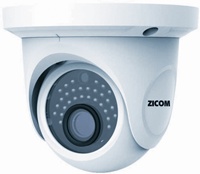From thermal imaging cameras to video and audio analytics, security system providers in India are innovating and introducing the latest safety solutions to ensure maximum security to hotel guests especially the solo woman traveller By Rituparna Chatterjee

Hotel security deployment is becoming more prominent today with the continuous robust growth of the global tourism industry. UNWTO forecasts international tourism to grow by three to four per cent in 2015. With security becoming one of the key aspects of the hospitality sector, technology goes on to play a crucial role in meeting today’s security requirements. Hence it is imperative for hotels in India to stay up-to-date and work with technologies that could minimise human efforts significantly. From thermal imaging cameras that see through smoke, night vision technology which works in little and almost no light to explosion protected cameras and weather-proof technology, there are several security cameras being introduced to work in all kinds of extreme weather conditions. Apart from that there are analytics applications as well such as video motion detection and cross-line detection which triggers specific action to improve surveillance system efficiency and facilitate investigation.“Though there are many security camera devices in the market, currently the High-Definition over Coax (HDoC), HDTVI, 2K and 4K, IP cameras with H.265 new codec format gives hotels the best quality of video,” states Pramoud Rao, managing director, Zicom Electronic Security Systems. Adding to this, Amit Maheshwari, director – marketing and strategy, UTC Climate, Controls & Security, opines, “IP cameras have been in India for quite some time now and they are being constantly upgraded with new features like cloud based video surveillance, HD and megapixel cameras, cameras with higher storage capacity, remotely controlled cameras, digital wireless cameras, upgraded and effective digital video recorders, interconnecting systems, IR technology with LEDs and advanced technologies to counter counterfeit devices, to name a few.”
Today, increasing concern over guest safety has led to the installation of security camera devices at every nook and corner of the hotels. The cameras are installed at different locations including corridors, parking lots, lobbies, lifts, main entrances, restaurants and bars. They are integrated with camera stations that can be installed in the electrical panel rooms and DG power rooms for 24/7 monitoring. “Today, there is a sea change in terms of security to protect guests and the property from any kind of damage. Before 26/11 in Mumbai, many hotels did not focus on their security departments, which were just supportive departments that focused on guest related operations. However, after 2011, there was a drastic change in the thought process of the hotel managements. People started using security centric programmers and protocols. Today, safety and security is becoming a sales differentiator for many hotels. All of this is done in a manner that blends aesthetics and security,” mentions Rao, adding that, his company has introduced a wide range of fingerprint locks (FPL) and access control to manage and secure multiple access entry. “FPL is one of the most innovative and hassle free security devices. We have access control and FPL which is integrated with the CCTV system that can easily manage to take the snapshot of a person while accessing the doors. Today, newer hotels which are under development are re-looking at their design aspects with greater attention being given towards integrated surveillance systems,” mentions Rao. As for UTC Climate, Controls & Security, its Integrated Security Platform provides an overview of all security technologies like access control, intrusion detection, fire detection and camera surveillance on one screen with full control of all the functionalities.
IP based security

Currently, there is a shift from analog to IP based security cameras across all verticals, including the hospitality sector. These IP based cameras are modular, cost-effective and easy-to-deploy solutions and have an efficient networking and storage approach and provide a sophisticated security system at an affordable price. “Axis Communications has been providing a wide array of IP based products and technologies. These IP based technologies are ideal for the hospitality sector as it allows users to monitor their network over the Internet from anywhere. This helps in ensuring safety and vigilance throughout. The hotel has to install it just once and take advantage of a variety of different product offerings through this integration including – Video Surveillance Guard Tours, Device Monitoring and Video Alarm Verification (VAV),” points out Sudhindra Holla, country manager, Axis Communications – India and SAARC.
The other emerging trend is going beyond security cameras to video analytics. This solution enables hotels to keep a track of the number of footprints and also helps them in multi-location remote monitoring, staff and store management, all from a central location. “Axis implemented its video analytics solutions and cameras across 500 Café Coffee Day (CCD) outlets in India. Being one of the leading coffee retail chains in the country, CCD places considerable emphasis on ensuring customers’ comfort and privacy. So the surveillance systems had to be implemented in a way that didn’t compromise with the customer experience,” states Holla. AXIS M3011, AXIS M3004-V and AXIS M3203 Network Cameras have been deployed in the dispensing and the billing counters for monitoring. These cameras are specifically designed for the cafe/ restaurant business as these are high definition vandal-proof cameras with edge storage best suited for this purpose.
Single-woman traveller

With crime rates increasing at an alarming rate, women safety has become a major concern in our country. The hospitality sector has evolved from what it used to be as the solo woman traveller has become a norm, especially with the increasing women workforce in companies. Voicing this thought, Maheshwari states, “Hotel safety and security is a growing concern among women travellers throughout the world. Guests and staff need reassurance that security is right in the spotlight. Today, quality hotels are expected to have in place high standards, policies and procedures. It is important to broaden the focus of risk and systematise processes to react adequately and limit the disruption of the company’s operations.” Axis Communications recently launched several security solutions to cater to this need. This includes video and audio analytics, Lighfinder technology (cameras with the Lightfinder technology have extreme light sensitivity and can deliver images in as little light as 0.18 lux or lower), Zipstream technology (optimised for video surveillance), and AXIS A8004-VE Network Video Door Station (an IP based door station that is ideal for two-way communication, identification and remote entry control).
Tech next
 Technology has come a long way, from being a passive form of surveillance that quietly monitors for potential threats to becoming a real business tool and an enabler for many proactive add-on solutions. Cameras already have myriad features, ranging from motion and audio detection to more advanced capabilities like video analytics, UHD, HD cameras, spotting camera tampering, people counting, virtual fences, vehicle number plate recognition, among others. As for future innovation or trends in this space, Rao predicts that the image quality will continue to improve as a result of improvements in lenses, compression, storage and camera technologies. “Intelligent video systems that extract video and data from surveillance videos, such as retail management systems or access control systems, will increasingly become the norm,” he says. Adding to this, Holla believes, “Video surveillance is going beyond monitoring to heat mapping, smart analytics, thermal imagery, selective motion detection and identification, among various others. We see it as a driving growth across various industries and government applications.”
Technology has come a long way, from being a passive form of surveillance that quietly monitors for potential threats to becoming a real business tool and an enabler for many proactive add-on solutions. Cameras already have myriad features, ranging from motion and audio detection to more advanced capabilities like video analytics, UHD, HD cameras, spotting camera tampering, people counting, virtual fences, vehicle number plate recognition, among others. As for future innovation or trends in this space, Rao predicts that the image quality will continue to improve as a result of improvements in lenses, compression, storage and camera technologies. “Intelligent video systems that extract video and data from surveillance videos, such as retail management systems or access control systems, will increasingly become the norm,” he says. Adding to this, Holla believes, “Video surveillance is going beyond monitoring to heat mapping, smart analytics, thermal imagery, selective motion detection and identification, among various others. We see it as a driving growth across various industries and government applications.”

